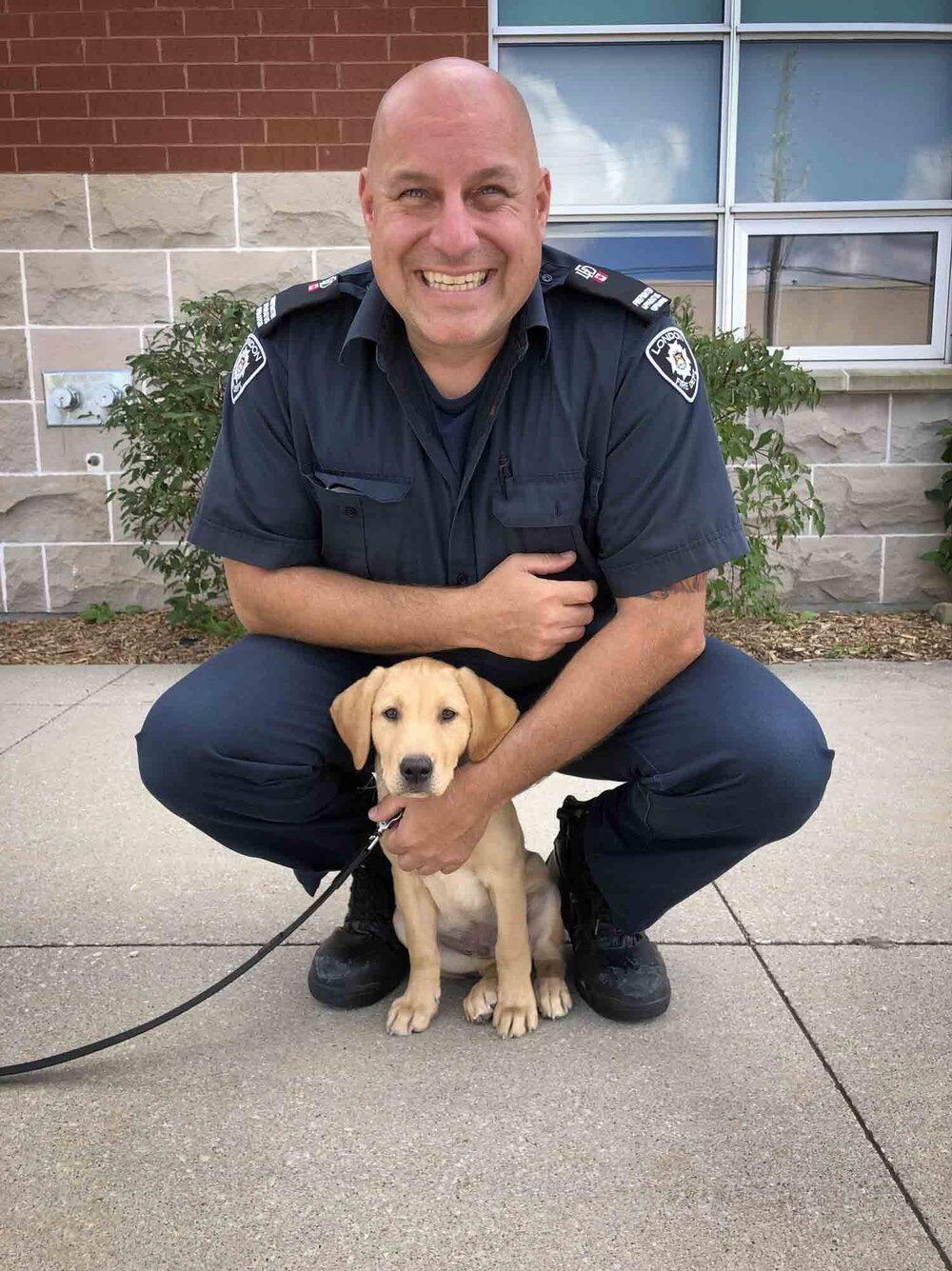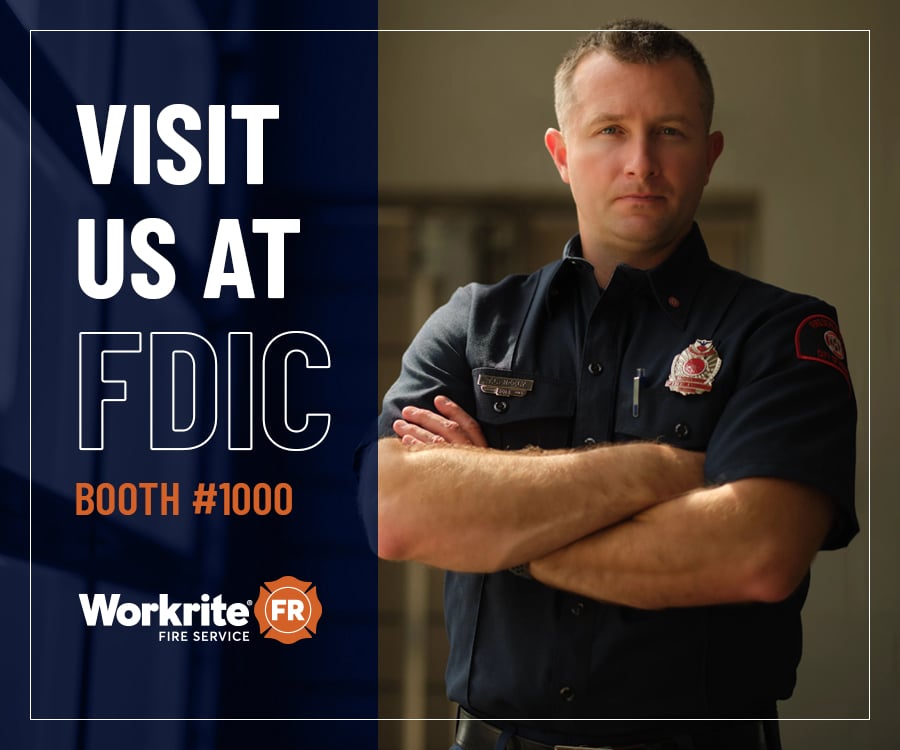Canine Therapy: Brad Dodd Story

By: Millicent Simonics
“Service dogs help one person mitigate things that they cannot do for themselves that the dog will assist them with – it is a medical device that is doing something you cannot do yourself.”
Some things in life come naturally to us. For some, it’s physical prowess. For others, it’s an academic inclination. For what does not come naturally, we have to strive and reach deep within ourselves to overcome our personal obstacles and reach our full potential.
Choosing to be a firefighter
For firefighter Brad Dodd, there was plenty that came natural to him, specifically his career path, which he found without question. He was raised in Pelham, Ontario, in the firefighting community, which left a positive impression on him. His father was a volunteer firefighter. He did that for roughly 20 years, so he had a very strong impression of the fire department. It was very inclusive — he fell in love with that.
So, naturally, Brad felt inspired to join the ranks as a firefighter himself: he started to volunteer when he was maybe 22 and knew after his first day that was what he wanted to do for a career. He volunteered for just under ten years — for a couple years in Port Colborne, then transferred over and was in Pelham, at the same station his dad was at. He got hired for the fire department in London in 2002 — he tried for nine years before he got on full time.
Working with dogs
Brad also had an inclination towards working with dogs. He began canine training programs at a young age, and it had a natural progression for him. He had always been involved with dogs since he was young — getting his first at 20-years-old. It was a problematic Jack Russell so he started doing some training with Dave McMahon, based out of Niagara Falls. The dog responded well for a dog that was very hard to train. So, Brad started getting more involved with the training. He continued working with Dave for probably three years or so with a bunch of different dogs, gaining a solid grasp of the dog world and what it meant to train with them. Next, Brad got a Labrador Retriever that he did therapy work with through St. John Ambulance.
Throughout Brad’s journey, he shared his passion for canine training with his wife Sara, a nurse, who didn’t have a whole lot of experience with dogs but wanted to learn more because she and Brad wanted to start their own program.
Therapy dogs for first responders
Together, they have worked as evaluators with St. John Ambulance’s therapy dog program and were inspired to evolve the service for a greater reach. St. John Ambulance does incredible work — but they wanted to expand and start doing more for first responders. They observed that dogs reacted differently to people if they are having a rough time as well as being more interactive. Because of this phenomenon, Brad and Sara knew there were massive benefits from the effects of canine therapy, so they wanted to expand to do EMS.
So, Brad and Sara switched gears. In 2013, they opened Quest Canine Services, a kennel in Sparta, Ontario, in order to fund their own dog training program but also so that Sara could gain more experience in working with dogs. They started this corporation, which was essentially paying them to develop the other program and they used the income from that to help them with ramping up the therapy program. It also gave Sara background, experience and confidence in dealing with dogs and even taught her how to train better.
Creating Phoenix Canine Initiative
In 2015, with more experience and confidence behind them, Brad and his wife started their therapy and service dog program, Phoenix Canine Initiative. The therapy portion of their program aims to provide dogs as stress relievers to anyone and everyone in need of their company. Brad and Sara explain saying, “The business that we do for the therapy dog program, would be for anyone who incurs stress on the job: police, fire, EMS. We have done hospitals, and we are with the London Children’s Aid Society.”
Additionally, the service portion of their program is more medical oriented in providing service dogs as an assistance device for individuals in need.“Service dogs help one person mitigate things that they cannot do for themselves that the dog will assist them with – it is a medical device that is doing something you cannot do yourself,” Brad explains. “So for example, if you had PTSD and you have a really hard time being in crowds, the dog is going to respond to that stress by going to the end of the leash and giving you a six foot buffer. Or if you are having night terrors, the dog will turn the light on and wake you up. So depending on what your issues are, we can help mitigate some of them with the dog.”
Dogs are the ultimate co-worker
Brad’s choice to work with dogs came naturally to him, but his goal took determination and work to achieve. His goal was designed to help others, but it also ended up helping Brad recognize his own personal struggles. When they first started the kennel, he was using the job as a crutch. He was a complete work-aholic. He had no work-life balance. He did not sleep well. He was working a ridiculous amount that it was unhealthy. Everybody has his or her crutch — his was submerging myself and keeping busy.
Through the recognition and support of his wife, his training work with therapy dogs and the support of his coworkers and friends, Brad was able to tackle his struggles head on. Sara noticed that he was having issues probably eight years ago. She recognized the effect the dog had on him. He might have had a really bad shift and the dogs would intuitively know something was different and would completely interact at a different level. When things started falling apart — his wife said “you need to go talk to somebody.” Brad took advice from friends at work and reached out to a therapist. He has been in therapy for 13 months and it has completely changed his life.
Supporting a firefighting community
For Brad, it came down to community. Initially, the fire services and dog-training communities inspired his career. Eventually, they kept him going through rough times. Now, they inspire him to give back. He took over a role at work of Critical Incident Stress Management Coordinator for his peer support team. He has always had a passion for helping people and realized that there are probably a lot of people working who are going through the same things that he was going through, if not a lot worse. If someone is having a hard time, they reach out and say “hey listen, I’m not doing well” or “my spouse is not doing well.” At that point, Brad can give them all the different options of what they have and let them navigate through what is most suitable for them.
In addition to advocating for canine therapy and providing peer support, Brad recognizes the importance of including family services in the network of support. They need to be able to push that — they start that with their new recruits. They always talk to them about critical stress management and peer support, what it is and how to utilize it. They are starting to open it up and have family night through their recruitment process, open to spouses, parents and siblings, to educate them on the realities of the job, work-related stress injuries, how long is normal to respond to them, how long is abnormal, if they are having a negative impact to a call for weeks or months. They need to be able to recognize what is normal in an abnormal situation.
Work life balance as first responders
Brad’s background and predisposition for dog training led him and his wife into providing an often unheeded yet essential service. He continues to work as a firefighter and his wife as a nurse. They have since left the kennel business to focus on working with therapy and service dogs.
Brad’s advice for maintaining a healthy balance in work and life: balance is important. Question why you are doing this. People start businesses for a multitude of different reasons but it’s important to recognize our reasons for doing it. Is it something that’s helping or is it something that’s a hindrance?
“I love my life. I love giving back and making a difference, but you have to do a lot of leg work to do those things. Also, having a hobby is super important —hobbies that are not work-related. Last year, I bought a boat and started fishing again, spending time with my kids and connecting with them. I have to work on it everyday to take a little bit of time for myself.”
Podcast
Contests & Promotions
















